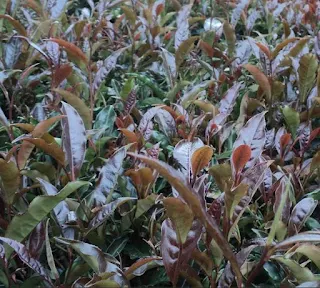Growing Kenyan Fields of Purple Tea Leaves
Mount Kenya grows purple tea leaves that make a royal cup of thistle colored purple tea.
Black tea was first introduced in Kenya around 1904, on a farm on the foothills of Mount Kenya, today's farmers grow unique purple tea plants.Growing Fields of Purple Tea leaves in Africa’s Kenya
| Kenyan farmers grow purple tea leaves that make a unique cup of purple tea. |
Kenya in East Africa is the world’s leading exporters of tea and Kenya's Kirinyaga County town of Kerugoya is the crown jewel of purple tea leaves. The purple comes from leaves with high levels of anthocyanins, responsible for the red, purple, and blue colors in fruits, vegetables, cereal grains, and flowers.
Kenya's purple tea leaves were developed and pre-released by the Tea Research Foundation of Kenya however, there is currently a very small market for purple tea, the processing techniques use hand rolling methods, a lengthy process.
According to the Tea Research Foundation of Kenya, currently Kenya produces and exports over 96 percent of its tea as black teas. The tea is sold to the world market in bulk largely used for blending lower quality teas.
Subsequently, Kenya’s teas fetch low prices at the markets. Introducing specialty purple tea is a challenging market for Kenya’s tea farmers since the new variety of purple tea sells for up to 4 times the price as black tea and red tea.
 |
| Kenya's purple tea leaves |
When brewing a perfect cup of purple tea, use a tea strainer. The tea strainer eliminates the need to strain off leaves later. Add your desired amount of tea leaves to a tea strainer or teapot. Cover with hot water a let steep for 5 minutes or until you have created your perfect cup of tea based on your preference.
Did you know?
Tourism is number one in the Kenyan economy however, about 75 percent of Kenya’s population works at least part-time in agriculture activities. Tea, coffee, corn, wheat, sugarcane, fruit, vegetables; dairy products, beef, fish, pork, poultry, and eggs are the leading agriculture products in Kenya.
More drink recipes to whip up today.
- Legal Drinking Age in Africa
- Ibwatu African Energy Drink
- Tzaneen Pawpaw Coconut Chiller
- Dried Hibiscus Flowers Red Party Punch
- Viagra Green Fig Tea
- Sugar Cane Drink
- South African Amarula Brown Elephant Recipe




